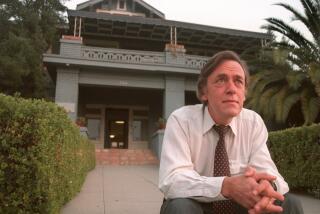Richard P. McKee dies at 62; open government advocate
Richard P. McKee, a chemistry professor who was so offended by a Glendora official’s effort to thwart public comment at a meeting that he became one of California’s most effective advocates for open government, died Saturday at his home in La Verne. He was 62.
The cause was an apparent heart attack, said his daughter Kelly Aviles.
In 1994, McKee launched a crusade against violators of the Brown Act, the 1953 state law that requires governing bodies and public agencies to hold open meetings at which members of the public can comment.
Despite his lack of formal legal training, the longtime Pasadena City College instructor “took to court and won more open government … lawsuits than any member of the State Bar of California,” said Terry Francke, general counsel of Californians Aware, the advocacy group that McKee co-founded with Francke and his daughter, Emily, in 2004. “He was both the good cop and the bad cop of local government transparency in this state.”
McKee, a large man who was more than 6 feet tall, was often viewed as a gadfly.
“I would get a phone call saying ‘this guy Richard McKee won’t let us make our decision,’ ” recalled Framroze Virjee, a Los Angeles labor and employment lawyer with O’Melveny & Myers who has represented government clients in Brown Act complaints lodged by McKee. “They would either ignore him or be confrontational with him, thinking he would go away. But he was a wonderfully intelligent fellow who knew the Brown Act up and down. And, inevitably, he was right.”
In hundreds of cases, a phone call or letter from McKee fixed the problem, which usually arose when a governing body failed to give adequate public notice of an action or restricted the public’s right to ask questions or offer statements at meetings.
When his warnings went unheeded, he went to court: He filed 25 lawsuits over the last 17 years and prevailed in the majority of them.
But he pursued the watchdog role at great personal expense.
In 2009, he was held liable for $80,000 in legal fees incurred by the Orange Unified School District board in defending itself against a lawsuit filed by McKee, Californians Aware and school board member Steve Rocco.
The lawsuit alleged violations of the Brown Act, California Public Records Act and 1st Amendment after the board censured Rocco for criticizing a school principal during an open session; the district staff later edited his remarks out of a video recording of the meeting.
The district won the case and was awarded attorney fees. Californians Aware had no money and also had agreed that Rocco would not be held liable. That left McKee.
A lien was placed on the chemistry professor’s home and his wages were garnished. He delayed his retirement until last year and tapped his savings to cover the award.
His plight drew the attention of Sen. Leland Yee (D-San Francisco), who drafted legislation to limit the ability of cities, counties and state agencies to collect legal fees from losing plaintiffs in cases pressing enforcement of California’s laws on open meetings and access to public records. The bill was passed in 2009 and became effective last year.
Although the law came too late to help McKee, it was praised by journalists and 1st Amendment groups for removing a barrier to citizen enforcement of the open government policy.
McKee came to the battle in the early 1990s when a friend urged him to attend a meeting of the Glendora City Council at which a controversial police contract was up for discussion. The experience left him aghast.
The room was packed with people who wanted to address the contract. But public comment was delayed until after 11 p.m., by which time only three people remained who wished to speak.
“I thought, ‘My gosh, this can’t be the way city government is supposed to be run,’ ” McKee recalled in a 2007 interview with the Inland Valley Daily Bulletin.
He sued Glendora for stifling public comment but lost. He sued it on another Brown Act violation in 1995 but lost again.
McKee finally won his third case, in 1997, when he sued the Chino Valley Unified School District for agreeing to a buyout of the superintendent’s contract during a closed session that was supposed to only address job performance.
“After that,” Francke said of McKee, “he was pretty much a skyrocket,” winning cases against such entities as the city of Claremont and the Los Angeles County Board of Supervisors.
“There are many politicians out there trying to hide their mistakes from the bright lights of public scrutiny,” McKee told The Times in 1999. “I make sure they wash their dirty laundry in public.”
McKee, who was born July 5, 1948, grew up in Southern California and earned bachelor’s and masters degrees in chemistry at Cal State Long Beach.
McKee was divorced four times. In addition to his daughter Kelly, he is survived by his parents, Richard and Virginia McKee of Azusa; a son, Ryan, who is stationed with the Air Force in Georgia; another daughter, Casey Heriott of Boise, Idaho; a brother, Ron of Indio; a sister, Lindy Osbrink of San Dimas; his companion, Christine Tutter of Alta Loma; and two grandchildren.
A memorial service will be announced later.
More to Read
Start your day right
Sign up for Essential California for the L.A. Times biggest news, features and recommendations in your inbox six days a week.
You may occasionally receive promotional content from the Los Angeles Times.





















































